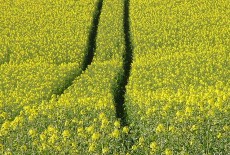قالوا : يا رسول الله ! وما عجوزبني إسرائيل ؟ قال :” إنَّ موسى ـ عليه السلام ـ لما سارَ ببني إسرائيل من مصر ؛ضَلّوا الطريق ، فقال : ما هذا ؟ فقال علماؤهم : إنَّ يوسفَ ـ عليه السلام ـ لمّاحضره الموتُ ؛ أخذ علينا موثقاً من الله ، أن لا نخرجَ من مصر حتّى ننقلَ عظامَهمعنا ـ أي بدنه ، وهو من باب إطلاق الجزء ويراد به الكل ، فالأنبياء لا تأكل الأرضأجسادهم كما صح بذلك الخبر عن خير البشر ـ قال : فمن يعلمُ موضع قبره ؟ قال : عجوزمن بني إسرائيل ، فبعث إليها ، فقال : دلَّيني على قبر يوسفَ ، قالت : حتى تعطينيحُكمي . قال : وما حكمكِ ؟ قالت : أكونُ معك في الجنة ، فكره أن يعطيها ذلك ، فأوحىاللهُ إليه أن أعطها حكمَها ، فانطلقت بهم إلى بحيرة موضع مستنقعِ ما ، فقالت : انضبوا هذا الماء ، فأنضبوه ، فقالت : احفروا ، فحفروا ، فاستخرجوا عظامَ يوسف ،فلما أقلّوه إلى الأرض ؛ فإذا الطريقُ مثل ضوء النهار ”
السلسة الصحيحة ـللألباني (313) وصحيح موارد الظمآن (2/452) (2064) .
From Abu Burdah: from Abu Musa who said: ‘The Prophet (sallalhu `alayhi wa sallam) came to a bedouin who treated him (or whose hospitality was) generously, so he said to him: ‘Come visit us (sometime so we will also treat you generously) .’ So (later) he came to him, Allaah’s Messenger (sallalhu `alayhi wa sallam) said [and in one narration: Allaah’s Messenger (sallalhu `alayhi wa sallam) stopped off as a guest with a bedouin, and he treated him generously. So Allaah’s Messenger (sallalhu `alayhi wa sallam) said to him: ‘We will remember this, so come to us.’ ] So later the bedouin came to him, and Allaah’s Messenger (sallalhu `alayhi wa sallam) said:
‘Ask for whatever you need.’ so he said: ‘A she-camel with its saddle, and some goats which my wife/family can milk.’ So Allaah’s Messenger said: ‘Are you unable to be like the old woman of the Banu Israel?’ So his Companions said: ‘O Messenger of Allaah! And what does ‘the old woman of the Banu Israel’ refer to?’
He said: ‘When Musa left Egypt at night with the Banu Israel they lost their way. So he said: ‘What is wrong?’ So their learned men (scholars of Banu Israel) said:[‘We shall tell you.] When death came to Yusuf (`alayhis salaam) he took a solemn agreement from us in Allaah’s Name that we would not depart from Egypt until we carried his body along with us.’ He said: ‘Then who knows the place of his grave?’ They said: None of us knows where the grave of Yusuf is, except for an old woman of the Banu Israel. So he sent for her, and she came to him.
He said: ‘Guide me to the grave of Yusuf.’ She said: [‘No, by Allaah! I will not do so] until you grant me my reward.’ He said: ‘And what reward do you want?’ She said: ‘That I should be with you in Paradise.’ So he disliked to grant her that, but Allaah revealed to him: ‘Grant her, her due reward. So she went with them to a pond: a place where water gathered, and she said: ‘Drain this water away.’ So they drained it (and in another narration it says so they drained it and then the ground became visible to which). She said: ‘Dig here and extract the body of Yusuf.’ So when they lifted it out and placed it upon the ground the path suddenly became bright like the light of day.
Some Lessons from this hadeeth [Translated from Shaykh Sifat Alam Madani in Kuwait ]
1) Honouring the guest
This hadeeth shows how our prophet (sallalahu `alayhi wa sallam) treated his guests. And also how one should treat his guests – i.e. with utmost respect and honour. So much so that the prophet (sallalahu `alayhi wa sallam) himself said as reported in the saheehayn (Bukhaari 6019 and Muslim 47) that “Whosoever believes in Allah and the day of judgement, let him honour his guests”
[Translator’s Note: Note that the prophet emphasized to the extent that he mentioned belief in allah and the day of judgement. Both belief in allah with tawheed and the belief in the day of judgement is something that was specific to the believers at a time when a vast majority opposed it]
The quality of hospitality was found with our prophet to the extent that during the first revelation when the prophet came scared to his wife Khadeeja (radhiallahu `anha) she consoled by mentioning his quality that he was always honourable to the guests.
This quality of the prophet was copied by his students – the companions – radhiallahu `anhum ajma`een. In Saheeh Bukhaari and Muslim Abu Huraira reported that a person came to Allah’s Messenger (ﷺ) and said:
I am hard pressed by hunger. He sent (message) to one of his wives (to procure food for him). but she said: By Him Who has sent you with Truth, thrre is nothing with me (to serve him) but only water. He (the Holy Prophet) then sent the (same) message to another, and she gave the same reply, until all of them gave the same reply: By Him Who has sent thee with the Truth, there is nothing with me but only water, whereupon he (the Holy Prophet) said: Allah would show mercy to him who will entertain this guest tonight. A person from the Ansar stood up and said: Messenger of Allah, I (am ready to entertain). He took him to his house and said to his wife: Is there anything with you (to serve the gdest)? She said: No, but only a subsistence for our children. He said: Distract their attention with something, and when the guest enters extinguish the lamp and give him the impression that we are eating. So they sat down. and the guest had his meal. When it was morning he went to Allah’s Apostle (ﷺ) who said: Allah was well pleased with what you both did for your guest this night.
2) Ihsaan ka Balda Ihsaan – Returning goodness with goodness
Another important lesson we learn is how the prophet (sallalahu `alayhi wa sallam) asked the bedouin to visit him . This shows that one should strive to treat goodness with goodness . This echoes in the prophet’s personal teaching as well when he (`alayhi salatu was-salaam) said :
وَمَنْ صَنَعَ إِلَيْكُمْ مَعْرُوفاً فَكَافِئُوهُ فَإِنْ لَمْ تَجِدُوا مَا تُكَافِئُونَهُ فَادْعُوا لَهُ حَتَّى تَرَوْا أَنَّكُمْ قَدْ كَافَأْتُمُوهُ (Sunan أبي داود: 1672)
I will quote below some narrations and events from books that serve not only as a support to show/prove the above but also some narrations are against the mentality of the takfeeri khawarij who happen to take everything from wala al-bara’a to implementing hudood and shar`iah in a wrong self interpretating way. These narrations show that the prophet (sallalahu `alayhi wa sallam) returned back the favour of even Non Muslims or atleast tried to openly then what about those khawarij who kill and call towards killing innocent non Muslims many of whom are indulged in charity work for Muslim welfare?
Narrated Jubair bin Mut`im (radhiallahu `anhu): The Prophet (sallalahu `alayhi wa sallam) talked about war prisoners of Badr saying: “Had al-Mut`im bin `Adee been alive and interceded with me for these mean people, I would have freed them for his sake.”
[Ref: Bukhaari (1393, 6516)]
That is because he granted shelter to the Prophet (sallalahu `alayhi wa sallam) when he returned from At-Taa’if as everybody else whom the prophet requested to grant him security had refused such as Al-Akhnas ibn Shuraiq and Suhail ibn `Amr. Also, he was the one who ordered the paper that laid siege to Bani Haashim to be torn out.
3) Asking Proper questions
The bedouin (who was a desert dweller and usually they are coarse and mannerless) happened to ask for a camel and a milk giving goat as these two commodities are valuable to the desert bedouin’s surival. Yet the prophet (sallalahu `alayhi wa sallam) disliked his demand not because he was god Forbid stingy. Rather the magnitude of his generosity was such that when a man came asking for booty, he gave him sheeps filled between two entire mountains [Ref: Saheeh Muslim 2312]
But the Messenger of Allah (sallalahu `alayhi wa sallam) disliked his question because he wanted the bedouin to take advantage of the prophet’s offer to ask for something far greater and as an example he quoted the incident of the old woman who demanded that she get a place near Musa in the heavens.
This is because
Sahl bin Sa’d narrated that the Messenger of Allah (sallalahu `alayhi wa sallam) said: “If the world to Allah was equal to a mosquito’s wing, then He would not allow the disbeliever to have a sip of water from it.”
[Ref: Jami` at-Tirmidhi 2320]
Shaykh Sifat Alam (hafidhaullah) happened to further elaborate this point but i will conclude the translation here . More from the shaykh can be read here : http://www.safattaimi.com/
Translator’s Note:
عَنِ ابْنِ عُمَرَ قَالَ قَالَ رَسُولُ اللَّهِ صَلَّى اللَّهُ عَلَيْهِ وَسَلَّمَ الاقْتِصَادُ فِي النَّفَقَةِ نِصْفُ الْمَعِيشَةِ وَالتَّوَدُّدُ إِلَى النَّاسِ نِصْفُ الْعَقْلِ وَحُسْنُ السُّؤَالِ نِصْفُ الْعِلْمِ
Ibn Umar reported: The Messenger of Allah (sallalahu `alayhi wa sallam) is reported to have said, “Moderation in spending is half of livelihood; loving care toward the people is half of reasoning; and the good question is half of knowledge.”
[Ref: Al-Bayhaqi, Shu`b Al-Iman, Number 6066, Munkar]
The Salaf and Good Manners in asking questions.
Yunus bin `Ubaid narrated that Maimoon bin Mihraan said:
“Showing affection towards the people is half of understanding, and good manners in asking the question is half of knowledge.”
On the authority of Sa`d bin Ibrahim that Ibn `Abbas (radhiallahu `anhu) said:
“No one asked me a question about an issue, except that I understood (from his questioning) if he is a person of understanding or not?”
On the authority of Imam Malik (rahimahullah) that whenever a person would come to Zaid bin Aslam for asking questions, and he (the questioner) mixes up (the question), he would say to him:
“Go and (first) learn how to ask (questions). When you have done so; then ask.”
[Ref: al-Faqeeh wal-Mutafaqqih of al-Khateeb al-Baghdaadee (2/63-65)]





